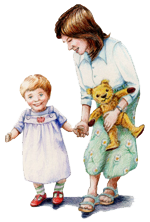Early Years Foundation Stage (EYFS) became law on the 1st September 2008. An updated version will be in place on the 1st of September 2012. It applies to all children under the age of five. Every setting registered with Ofsted must now comply with the same set of standards.
It's created a single quality framework that brings together, the Foundation Stage, Birth to Three Matters and the National Standards for Under Eights Daycare and Childminding. When parents choose an early years setting, they can be assured that whatever their preference their child will have observations, checks, assessments and planning that support their childs' learning and development.
The Childcare Act 2006 which delivered EYFS, requires three elements for learning and development.
The Early Learning Goals
There are seven areas of learning and development;
Prime areas
- Communication and language
- Physical development
- Personal, social and emotional development
Specific areas
- Literacy
- Mathematics
- Understanding the world
- Expressive art and design
The Educational Programmes
How we put the Early Learning Goals into practice, with activities and experiences for children. Reflecting on the different ways children learn using the three characteristics of effective learning. As follows:-
- Playing and exploring
- Active learning
- Creating and thinking critically
The assessment Arrangements
The EYFS requires practitioners to review children's progress and share a summary with parents.
A written record showing the child's progress in the prime areas between the ages of 24 and 36 months is given to parents.
An EYFS profile of the child's achievements at the end of their final year.


